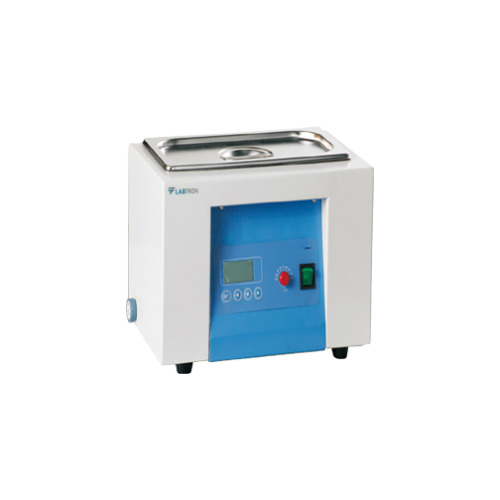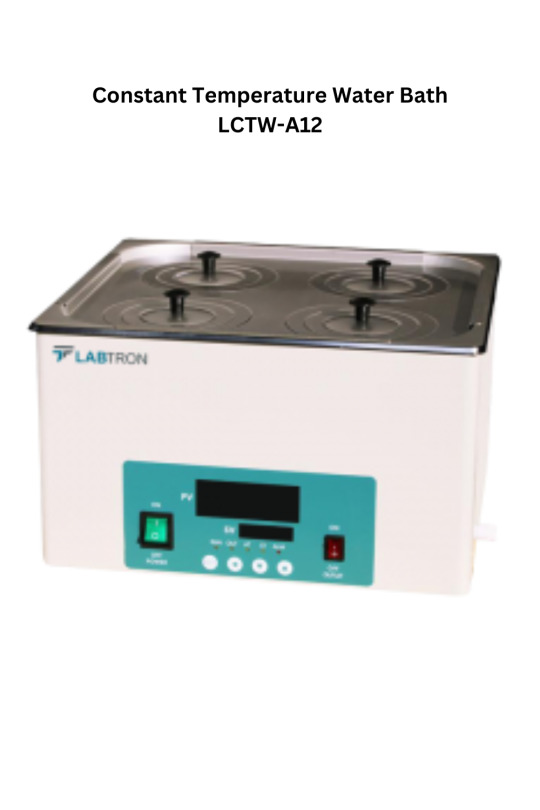#TemperatureStability
Explore tagged Tumblr posts
Text
Silicone Oil - Premium Lubrication & Protection Solutions
Discover top-quality Silicone Oil for superior lubrication and protection in various applications. Ideal for reducing friction, preventing wear, and enhancing performance in both industrial and consumer products. Our Silicone Oil offers excellent temperature stability and water resistance, making it perfect for automotive, electronics, and more. Explore our range for optimal efficiency and reliability.
Call us at: +65 9838 5264

#SiliconeOil#PremiumLubrication#IndustrialSolutions#FrictionReduction#WearPrevention#TemperatureStability#WaterResistance#AutomotiveCare#ElectronicsMaintenance#LubricationSolutions
0 notes
Text
Thermostatic Water Bath

Labtron Thermostatic Water Bath offers a 5 L capacity with 2 holes and 1 row. It operates from RT +5°C to 99°C with ±0.5°C stability. Features include a 12 mm cover aperture, a 1 to 9999-minute timer, an LCD screen, stainless steel shelves, an auto heater cut-off, and audible alarms.
0 notes
Text

Constant Temperature Water Bath LCTW-A12
Labtron Constant Temperature Water Bath is a 14.6 L capacity, temperature range of RT +5°C to 100°C, and a stainless steel heating tube. It features fixed temperature operation, timing function, one-button operation, and a convenient drain. The PID controller ensures precise control. The cold-rolled steel outer shell with a chemical-resistant coating ensures durability.
0 notes
Text
Where temperature stability takes centre stage. Say goodbye to the fluctuations of sudden heat and cold, as this insulation marvel ensures a consistent climate inside. Not only does it safeguard your assets, but it's also a smart investment that significantly reduces energy costs. Elevate your warehouse efficiency, protect your inventory, and experience the superior insulation prowess of Aerolam XLPE. Learn more at www.aerolam.com.
0 notes
Text
Temperature-Stable Experimental Tuberculosis Vaccine Enters Clinical Testing
Scanning electron micrograph of Mycobacterium tuberculosis germs, which trigger tuberculosis.National Institute of Allergic reaction and Transmittable Illness, National Institutes of Health.
Vaccinations have actually started in a Stage 1 human clinical trial testing a freeze-dried, temperature-stable formula of an experimental tuberculosis (TB) vaccine prospect. The trial is being performed at the Saint Louis University School of Medication Center for Vaccine Advancement and will register as lots of as 48 healthy adult volunteers aged 18 to 55 years. The experimental vaccine, called ID93, was established by researchers at the Transmittable Illness Research Study Institute (IDRI) in Seattle. The National Institute of Allergic Reaction and Transmittable Illness (NIAID), part of the National Institutes of Health, is supporting the trial through an agreement to IDRI.
ID93 is a recombinant vaccine prospect made from 4 proteins of Mycobacterium tuberculosis ( the germs that triggers TB). Lots of vaccines need a temperature-controlled system throughout transportation, which can be pricey and logistically difficult. Freeze-dried powder vaccines can be dispersed at a more affordable expense to remote, low-resource settings. The powder solutions are combined with sterilized water for administering with a needle and syringe. Private investigators are analyzing if a powder formula integrating ID93 and the adjuvant GLA-SE (an immune response-stimulating protein) in a single vial, reconstituted with sterilized water, is as reliable at causing an immune reaction in individuals as the formerly evaluated two-vial mix of powdered ID93 and liquid GLA-SE.
“Tuberculosis remains the leading infectious cause of death worldwide, and a highly effective vaccine would be a crucial tool in ending this pandemic,” stated NIAID Director Anthony S. Fauci, M.D. “A vaccine that did not require a cold chain could be much more easily distributed to communities in need.”
Presently, Bacillus Calmette– Guérin (BCG) is the only Fda authorized TB vaccine. It is frequently provided to infants in TB-endemic areas to secure kids versus meningitis and distributed illness. Nevertheless, the vaccine does not effectively avoid TB illness in teenagers and grownups.
ID93 + GLA-SE is being established as a vaccine prospect that might be administered to individuals who have actually currently gotten the BCG vaccine or have actually currently been exposed to TB, to avoid reactivation or reinfection. The vaccine was just recently revealed to be safe and immunogenic in a Stage 2a clinical trial that registered grownups in South Africa who had actually just recently been treated of TB with basic treatment. Other early-stage clinical trials revealed ID93 + GLA-SE is safe and immunogenic in healthy grownups in the United States and in BCG-vaccinated grownups in South Africa.
“To our knowledge, the freeze-dried formulation of ID93 + GLA-SE represents the first time a thermostable vaccine candidate containing a modern immune-boosting substance has reached clinical testing,” stated Christopher Fox, Ph.D., vice president of Formulas at IDRI and primary detective of the NIAID agreement. “Implementing technologies designed for low-resource settings early in product development could help accelerate vaccine rollout in hard-to-reach areas.”
Daniel Hoft, M.D., Ph.D., director of the Department of Transmittable Illness, Allergic Reaction and Immunology at the Saint Louis University School of Medication, is the primary detective for the clinical trial. All individuals will get 2 vaccinations 56 days apart. Half of those registered (24 individuals) will get the single-vial formula of ID93 and GLA-SE, and the staying individuals will get the formerly evaluated two-vial discussion of powdered ID93 and liquid GLA-SE.
Individuals will be kept an eye on for any possible responses to the vaccine and will be asked to offer blood samples at defined time points over around 7 months. Private investigators will analyze the samples to identify if individuals have actually produced an immune reaction. To guarantee the security of individuals, a security tracking committee made up of an independent group of specialists will examine security information throughout the trial, which is anticipated to end in November2020 For more details, check out ClinicalTrials.gov and search identifier NCT03722472
New post published on: https://livescience.tech/2019/01/25/temperature-stable-experimental-tuberculosis-vaccine-enters-clinical-testing/
0 notes
Text
i've been trying for the past two hours to choke down the saddest and room-temperaturest cup of coffee i've ever had in my life courtesy of our cafeteria i'm about to throw in the towel though drinking it is making me too sad
1 note
·
View note
Text
Temperature-Stable Experimental Tuberculosis Vaccine Enters Clinical Testing


Scanning electron micrograph of Mycobacterium tuberculosis bacteria, which cause tuberculosis.National Institute of Allergy and Infectious Diseases, National Institutes of Health
Vaccinations have begun in a Phase 1 human clinical trial testing a freeze-dried, temperature-stable formulation of an experimental tuberculosis (TB) vaccine candidate. The trial is being conducted at the Saint Louis University School of Medicine Center for Vaccine Development and will enroll as many as 48 healthy adult volunteers aged 18 to 55 years. The experimental vaccine, called ID93, was developed by scientists at the Infectious Disease Research Institute (IDRI) in Seattle. The National Institute of Allergy and Infectious Diseases (NIAID), part of the National Institutes of Health, is supporting the trial through a contract to IDRI.
ID93 is a recombinant vaccine candidate made from four proteins of Mycobacterium tuberculosis (the bacterium that causes TB). Many vaccines require a temperature-controlled system during transport, which can be costly and logistically challenging. Freeze-dried powder vaccines can be distributed at a cheaper cost to remote, low-resource settings. The powder formulations are mixed with sterile water for administering with a needle and syringe. Investigators are examining if a powder formulation combining ID93 and the adjuvant GLA-SE (an immune response-stimulating protein) in a single vial, reconstituted with sterile water, is as effective at inducing an immune response in participants as the previously tested two-vial combination of powdered ID93 and liquid GLA-SE.
“Tuberculosis remains the leading infectious cause of death worldwide, and a highly effective vaccine would be a crucial tool in ending this pandemic,” said NIAID Director Anthony S. Fauci, M.D. “A vaccine that did not require a cold chain could be much more easily distributed to communities in need.”
Currently, Bacillus Calmette–Guérin (BCG) is the only Food and Drug Administration approved TB vaccine. It is commonly given to babies in TB-endemic regions to protect children against meningitis and disseminated disease. However, the vaccine does not adequately prevent TB disease in adolescents and adults.
ID93 + GLA-SE is being developed as a vaccine candidate that could be administered to people who have already received the BCG vaccine or have already been exposed to TB, to prevent reactivation or reinfection. The vaccine was recently shown to be safe and immunogenic in a Phase 2a clinical trial that enrolled adults in South Africa who had recently been cured of TB with standard therapy. Other early-stage clinical trials showed ID93 + GLA-SE is safe and immunogenic in healthy adults in the United States and in BCG-vaccinated adults in South Africa.
“To our knowledge, the freeze-dried formulation of ID93 + GLA-SE represents the first time a thermostable vaccine candidate containing a modern immune-boosting substance has reached clinical testing,” said Christopher Fox, Ph.D., vice president of Formulations at IDRI and principal investigator of the NIAID contract. “Implementing technologies designed for low-resource settings early in product development could help accelerate vaccine rollout in hard-to-reach areas.”
Daniel Hoft, M.D., Ph.D., director of the Division of Infectious Diseases, Allergy and Immunology at the Saint Louis University School of Medicine, is the principal investigator for the clinical trial. All participants will receive two vaccinations 56 days apart. Half of those enrolled (24 people) will receive the single-vial formulation of ID93 and GLA-SE, and the remaining participants will receive the previously tested two-vial presentation of powdered ID93 and liquid GLA-SE.
Participants will be monitored for any possible reactions to the vaccine and will be asked to provide blood samples at specified time points over approximately seven months. Investigators will examine the samples to determine if participants have generated an immune response. To ensure the safety of participants, a safety monitoring committee composed of an independent group of experts will review safety data throughout the trial, which is expected to end in November 2020. For more information, visit ClinicalTrials.gov and search identifier NCT03722472.
New post published on: https://www.livescience.tech/2019/01/25/temperature-stable-experimental-tuberculosis-vaccine-enters-clinical-testing/
0 notes